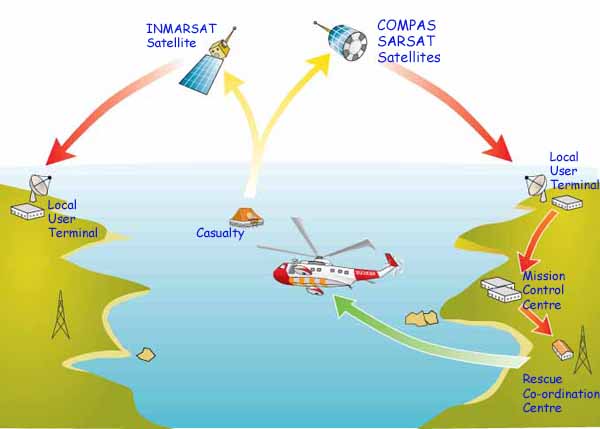 |
| GMDSS Operational Concept |
 IMSO Starts the Evaluation of Iridium
IMSO Starts the Evaluation of Iridium
The International Mobile Satellite Organisation (IMSO) has begun
the formal evaluation process of Iridium as a Global Maritime Distress
and Safety System (GMDSS) provider.
In November 2014, the IMO’s Marine Safety Committee (MSC) agreed
that the IMSO should put together a panel of experts to produce a
technical and operational assessment of Iridium, as it seeks to join
Inmarsat as a provider of GMDSS services.
The IMSO has formalised an agreement with Iridium to perform the evaluation, with the IMSO’s director general Captain Esteban Pacha having recently reported progress back to the IMO.
The group of experts put together by the IMSO will examine various aspects of Iridium’s infrastructure, such as earth stations, space segment, mobile terminals, terrestrial networks, GMDSS and search and rescue communications.
Captain Pacha is then expected to deliver the group’s report at the next session of the IMO Subcommittee on Navigation, Communications and Search and Rescue (NCSR-3), which will take place in 2016
Iridium and the GMDSS
IMO | NCSR 1st Session
Given the IMO meeting cycle, it will be at least 12 months (probably more) before approval is given. However, Iridium will be a game-changer for the GMDSS - both in terms of ship equipment and the overall architecture of marine communications.
The IMSO has formalised an agreement with Iridium to perform the evaluation, with the IMSO’s director general Captain Esteban Pacha having recently reported progress back to the IMO.
The group of experts put together by the IMSO will examine various aspects of Iridium’s infrastructure, such as earth stations, space segment, mobile terminals, terrestrial networks, GMDSS and search and rescue communications.
Captain Pacha is then expected to deliver the group’s report at the next session of the IMO Subcommittee on Navigation, Communications and Search and Rescue (NCSR-3), which will take place in 2016
 |
| Iridium Next |
IMSO's job is to ensure that
any new maritime satellite provider provides distress and safety
services in accordance with Resolution A.1001(25). This
Resolution sets out requirements regarding pre-emption, priority and
routing of distress alerts.
GMDSS satellite systems are
required to prioritise calls such that any distress alert receives
immediate priority on the system.
The great advantage of Iridium
over Inmarsat is that Iridium offers complete coverage of the polar
regions using low earth orbiting satellites. IMO | NCSR 1st Session
Recognition of Iridium as GMDSS service provider considered
Following consideration of information presented by the United
States for the recognition of the satellite communications company
Iridium as a Global Maritime Distress and Safety System (GMDSS) mobile
satellite service provider, the Sub-Committee agreed to invite the MSC
to consider and decide on which independent body should produce a
technical and operational assessment of the information and provide a
report to the NCSR Sub-Committee for evaluation. Following receipt and
evaluation of the assessment, the Sub-Committee would then make a
recommendation to the MSC as to the adoption of an MSC resolution
recognizing the new maritime mobile satellite services provider.
GMDSS in 2015 Iridium
After puzzling delays at the last IMO nav and comms (NCSR) meeting, integration of the Iridium satellite system into the GMDSS has finally been given the go-ahead by IMO's Maritime Safety Committee. The International Mobile Satellite Organisation (IMSO) will now conduct a technical evaluation of Iridium's proposal.Given the IMO meeting cycle, it will be at least 12 months (probably more) before approval is given. However, Iridium will be a game-changer for the GMDSS - both in terms of ship equipment and the overall architecture of marine communications.
Related Links
- Iridium GMDSS evaluation formally begins - Digital Ship - The world leader in maritime IT news
- 213-51804_NCSR_2_Summary_Report.pdf
- Enhancing maritime safety and security - Esteban Pacha
No comments:
Post a Comment